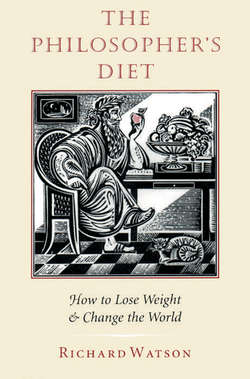Читать книгу The Philosopher's Diet - Richard Watson - Страница 3
На сайте Литреса книга снята с продажи.
ОглавлениеINTRODUCTION
IN THIS BOOK I tell how to take off weight and keep it off. The book also embodies a philosophy of life. The weight program is the content of the book, the philosophy of life is its form.
I take it for granted that you have asked yourself in these trying times what it all means. What does it all mean? And why don't philosophers tell us? A few years ago my mother asked me these two questions. She was seventy, her children were grown and gone from home, and she and my father had nothing to do but tend their garden, read, and watch television. She had a son who was a professional philosopher. She wanted to know. Why wouldn't I tell her?
My mother is not alone in her indignation. The editors of Time also would like to know what it all means. The editors of the Atlantic Monthly, of the Partisan Review, of the New York Times — they would like to know, too. Hugh Hefner, founding editor of Playboy, got so dissatisfied with the professionals a few years ago that he decided to have a go at it himself. Not only that, he sent copies of his work to many of us philosophers to set us straight. He wrote twenty-two installments of "The Playboy Philosophy" before he came to a stop. I have a chapter titled "Sex" myself.
For, as you have discerned, I have decided to take the complaints seriously. Why don't philosophers tell you what it all means? The answer is simple. They don't know. And I don't know much more than the others, but it just happens that I do know a number of things that, as Descartes said, it would be shameful of me to withhold. So I wrote a book.
Before you read this book, you doubtless want to know what my philosophy is. And in two sentences. Very well, let me say that I find these to be peculiar times. Some of us live the most extraordinarily satisfying lives in a century that has witnessed the genocidal slaughter of six million Jews; a world in which atom bombs have been dropped on Japanese cities, in which torture is common, and in which hundreds of millions of people live in conditions of abject poverty, starvation, oppression, and hopelessness. Sooner or later there will be another big war, and whoever starts it will have enough nerve gas and germs (never mind the panoply of nuclear, hydrogen, and neutron bombs) to wipe us all out. My daughter Anna, when she was a child, thought someone would push the button, and she asked me what we can do about it. I don't know. Probably nothing. My wife Pat, who is an archeologist, says there have always been winners and losers. Some of the earliest written records are about atrocities of war. For example, the key text for cracking the cuneiform code is a description of what Darius did to rebels in the fourth century B.C. He cut off their ears, put out their eyes, cut off their noses, and then dragged them behind his chariots in chains.
But you wanted to know my philosophy. It has to do with reading (covered in the chapter on "How to Live") and writing (covered in the chapter on "How to Die"). This philosophy is derived primarily from my Welsh mother and my Scots father. When I was very young, my mother used to sit beside me to make me practice the piano. "Let's get on with it," she would say. My father also had a saying. When I sought sympathy after stubbing a toe or falling down and skinning my knee, he would say, "Rub dirt in it." Two sentences.
So let's get on with it.
THE
PHILOSOPHER’S
DIET
